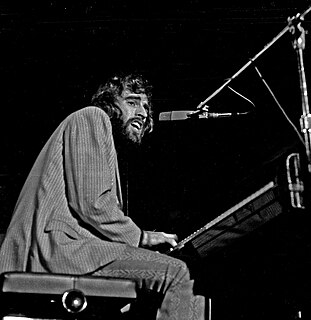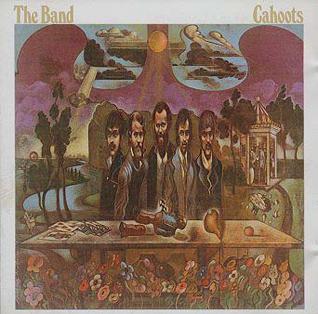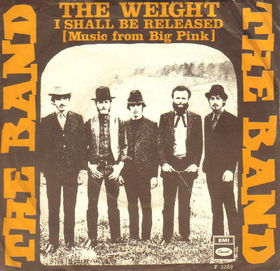Related Research Articles

The Band was a Canadian-American rock group formed in Toronto, Ontario, in 1967. Originally the backing band for Ronnie Hawkins and later Bob Dylan, the group released its debut album, Music from Big Pink, in 1968 to critical acclaim. Described by music critic Bruce Eder as "one of the most popular and influential rock groups in the world, their music embraced by critics ... as seriously as the music of the Beatles and the Rolling Stones". The Band combined elements of Americana, folk, rock, jazz, country, and R&B, influencing subsequent musicians such as the Eagles, Elton John, the Grateful Dead, the Flaming Lips, and Wilco.

Music from Big Pink is the debut studio album by the Band. Released in 1968, it employs a distinctive blend of country, rock, folk, classical, R&B, blues, and soul. The music was composed partly in "Big Pink", a house shared by Rick Danko, Richard Manuel and Garth Hudson in West Saugerties, New York. The album itself was recorded in studios in New York and Los Angeles in 1968, and followed the band's backing of Bob Dylan on his 1966 tour and time spent together in upstate New York recording material that was officially released in 1975 as The Basement Tapes, also with Dylan. The cover artwork is a painting by Dylan.

Richard Clare Danko was a Canadian musician, bassist, songwriter and singer, best known as a founding member of The Band.

Richard George Manuel was a Canadian composer, singer, and multi-instrumentalist, best known as a pianist and lead singer of The Band. The five members existed from December 1961 as The Hawks, becoming The Band in 1967, effectively breaking up in 1976, then re-formed in 1983. Manuel was with them until his 1986 suicide, a few hours after The Band performed a show.

Stage Fright is the third studio album by Canadian–American group the Band, released in 1970. It featured two of the group's best known songs, "The Shape I'm In" and "Stage Fright", both of which showcased inspired lead vocal performances and became staples in the group's live shows.

Cahoots is the fourth studio album by Canadian/American rock group the Band. It was released in 1971 to mixed reviews, and was their last album of original material for four years. The album's front cover was painted by New York artist/illustrator Gilbert Stone, while the back cover features a photograph portrait of the group by Richard Avedon. The album features guest vocals from Van Morrison. Libby Titus, Helm’s common-law wife at the time and mother of their daughter Amy Helm, also contributed uncredited backing vocals to "The River Hymn", the first time a woman appeared on a Band album.

Northern Lights – Southern Cross is the sixth studio album by Canadian-American rock group the Band, released in 1975. It was the first album to be recorded at their new California studio, Shangri-La, and the first album of all new material since 1971's Cahoots. All eight songs are credited as compositions of guitarist Robbie Robertson.

Jericho is the eighth studio album by Canadian-American rock group the Band. Coming seventeen years after their "farewell concert", it was released in 1993 and was the first album to feature the latter-day configuration of the group, as well as their first release for the Rhino subsidiary Pyramid Records.

Jubilation is the tenth and final studio album by Canadian/American rock group the Band. Recorded in the spring of 1998 in Levon Helm's home studio in Woodstock, New York, it was released on September 15, 1998. For the first time since the group reformed without guitarist and songwriter Robbie Robertson, there were more originals than covers. Songs include "Last Train to Memphis", featuring guest guitarist Eric Clapton, Garth Hudson's solo instrumental closer "French Girls", Rick Danko's "High Cotton" and the ode to Ronnie Hawkins, "White Cadillac".

Live at Watkins Glen is a 1995 album by the Band, presented by Capitol Records as a live album from the Summer Jam at Watkins Glen rock festival held outside Watkins Glen, New York, on July 28, 1973 in front of 600,000 people. Garth Hudson's organ solo, "Too Wet to Work", and the plainly titled "Jam" come from the actual Watkins Glen concert, as does the introduction of the group by Bill Graham. The former track appears on the out-of-print 1994 box set Across The Great Divide, but the latter track is only present on the Watkins Glen disc. The remainder of the tracks are two studio outtakes with overdubbed crowd noise, “Back to Memphis” and “Endless Highway”, plus four tracks from the Academy of Music shows in December 1971 and "Don't Ya Tell Henry" from the Woodstock festival in 1969. The two studio outtakes are available on the 2001 re-release of Moondog Matinee, without the crowd overdubs. The Academy of Music tracks are available on the 2001 two-CD re-release of Rock of Ages as "previously unavailable" tracks.

"The Weight" is an original song by the Canadian-American group The Band that was released as a single in 1968 and on the group's debut album Music from Big Pink. Written by Band member Robbie Robertson, the song is about a visitor's experiences in a town mentioned in the lyric's first line as Nazareth. "The Weight" has significantly influenced American popular music, having been listed as No. 41 on Rolling Stone's 500 Greatest Songs of All Time published in 2004. Pitchfork Media named it the 13th best song of the Sixties, and the Rock and Roll Hall of Fame named it one of the 500 Songs that Shaped Rock and Roll. PBS, which broadcast performances of the song in Ramble at the Ryman (2011), Austin City Limits (2012), and Quick Hits (2012), describes it as "a masterpiece of Biblical allusions, enigmatic lines and iconic characters" and notes its enduring popularity as "an essential part of the American songbook."
"Acadian Driftwood" is a song by The Band. It was the fourth track on their sixth studio album Northern Lights – Southern Cross (1975), written by member Robbie Robertson. Richard Manuel, Levon Helm and Rick Danko trade off lead vocals and harmonize on the chorus.
"Chest Fever" is a song recorded by the Band on its 1968 debut, Music from Big Pink. It is, according to Peter Viney, a historian of the group, "the Big Pink track that has appeared on most subsequent live albums and compilations", second only to "The Weight". The music for the piece was written by guitarist Robbie Robertson. Total authorship is typically credited solely to Robertson, although the lyrics, according to Levon Helm, were originally improvised by Levon Helm and Richard Manuel, telling the story of a man who becomes sick when he is spurned by the woman he loves.
"Look Out Cleveland" is the title of the Robbie Robertson-written song on The Band's self-titled album, also known as The Brown Album. The song begins with a boogie-woogie blues riff by pianist Richard Manuel followed by lead singer Rick Danko warning -- "Look out Cleveland, storm is coming through, And it’s runnin’ right up on you". However the Cleveland referenced in the song is not Cleveland, Ohio but likely Cleveland, Texas, a suburb of Houston which is also mentioned in the chorus -- "Look out, Houston, there’ll be thunder on the hill...". "Look Out Cleveland" differs from most of the songs on The Band's first two albums in that is more influenced by urban blues music than by rural music. According to music critic Nick DeRiso, Elton John's early song "Take Me to the Pilot" appears to be influenced by this song.
Stanley Martin Szelest was an American musician from Buffalo, New York, known for founding an influential blues band in the 1950s and 1960s, Stan and the Ravens, and later as a keyboardist with Ronnie Hawkins and, briefly, with The Band.
Let It Rock is a Juno Award-nominated album that documents American-Canadian singer Ronnie Hawkins' 60th birthday celebration and concert at Massey Hall in Toronto, Ontario, Canada. The concert took place on January 8, 1995 and featured performances by Hawkins, Carl Perkins, Jerry Lee Lewis, The Band and Larry Gowan. Jeff Healey sat in on guitar for most, if not all, of the performances. Hawkins' band, The Hawks, or permutations of it, backed most, if not all, of the acts. All of the musicians performing that night were collectively dubbed "The Rock ‘N’ Roll Orchestra". The concert is among the last recorded of both Perkins and Rick Danko of The Band. An eponymous video of the concert was also released.
Lonesome Suzie is a 1968 song by The Band written and sung by Richard Manuel originally appearing on their influential debut album Music From Big Pink It was also released on Across The Great Divide, a compilation box set from 1994. Drummer Levon Helm has said that "...Lonesome Suzie was Richard's failed attempt to write a hit record." It never charted and is one of the few songs on which Manuel contributed writing, but is also recognized as one of Manuel's signature pieces. In 1970 it was released as the B-side of the French single release of "Whispering Pines".

"Rag Mama Rag" is a song by The Band which was first released on their 1969 album The Band. It was also released as a single, reaching #16 in the UK, the highest of any single by the group. The single was less successful in the US, reaching only #57 on the Billboard Hot 100.
"Sleeping" is a song by The Band, first released on their 1970 album Stage Fright. It was also released as the B-side to the "Stage Fright" single. It was co-written by Robbie Robertson and Richard Manuel. This and “Just Another Whistle Stop” are the only two songs Manuel receives credit for on the album. Music critic Barney Hoskyns rates it as "one of Richard [Manuel's] liveliest performances" and "one of The Band's most intricate arrangements." The Band never featured the song on a live album.
"Daniel and the Sacred Harp" is a song written by Robbie Robertson that was first released by The Band on their 1970 album Stage Fright. It has been covered by such artists as Barrence Whitfield.
References
- ↑ Ruhlmann, William. "Music From Big Pink". All music guide. Retrieved 22 July 2013.
- ↑ Viney, Peter. "We Can Talk". All music guide. Retrieved 22 July 2013.
- ↑ Levon Helm, Stephen Davis (1993). This Wheel's on Fire – Levon Helm and the Story of The Band. Chicago Review. ISBN 1556524056.